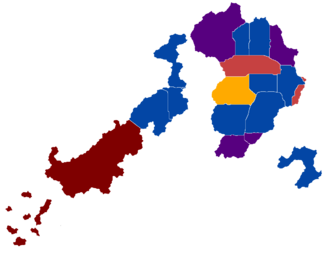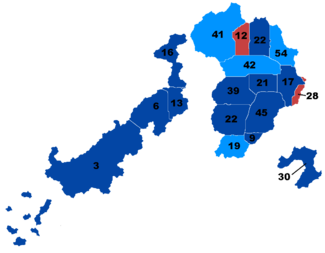2019 Tevitheimer Grand Chancellery Election
| |||||||||||||||||||||||||||||
439 members of the Electoral Council 220 votes needed to win | |||||||||||||||||||||||||||||
|---|---|---|---|---|---|---|---|---|---|---|---|---|---|---|---|---|---|---|---|---|---|---|---|---|---|---|---|---|---|
| Registered | 141,0789,656 ( | ||||||||||||||||||||||||||||
| Turnout | 116,732,250 (82.7%) ( 114,011,014 (80.8%) ( | ||||||||||||||||||||||||||||
| |||||||||||||||||||||||||||||
Map of jarldoms by first-place winner: Dark blue indicates jarldoms won by Bylund/Zhu. Red indicates jarldoms won by Torrents/Renzi. Purple indicates jarldoms won by Landser/Haraldsen. Orange indicates jarldoms won by Wang/Andersen. Brown indicates jarldoms won by Mor'Tins/Rasmussen. Light blue indicates jarldoms won in the second round by Torrents/Renzi but awarded their electoral votes to Bylund/Zhu under the Popular Vote Agreement.
| |||||||||||||||||||||||||||||
| |||||||||||||||||||||||||||||
The 2019 Tevitheimer Grand Chancellery Election was the tenth sextennial grand chancellery election in Tevitheim. The election consisted of two rounds. The first, held on 6 August, saw a total of six major candidates in the first round. As no candidate garnered a majority of electoral votes required, a runoff election would be held among the top two candidates, Chief Minister of Rookeryet Daniel Bylund and Alnatingsrepresentant from Elveanna Erik Torrents, on 27 August. Bylund would beat Torrents by a slim majority of just 1.1 million votes, or 2.0 percent, in what has been called one of the largest upsets in Tevitheimer political history. Incumbent grand chancellor Aud Raimundo of the Progressive-Greens party was ineligible to run for a second term, as Tevitheimer grand chancellors are prohibited from being elected to more than a single term. Raimundo's popularity led many to believe that the Progressive-Greens, usually the smaller of the two dominant left-wing parties in Tevitheim, would eclipse the Republican Party during the 2019 campaign, and incumbent Vice Chancellor Mikkel Landser was called the "prohibitive favorite" for the grand chancellery.
In the first round, the Social Union took first place with 26.0% of the vote and 118 electoral votes, followed by Torrents with 22.5% of the vote and 97 electoral votes, Mikkel Landser of the Progressive-Greens with 20.7% and 91 electoral votes, Harald Wang of the Liberal Democrats with 16.9% and 73 electoral votes, Sivert Grimsrud of the Nationals with 6.7% and 33 electoral votes, and in last place Worker's Party candidate Hull Mor'Tins with 5.0% and 27 electoral votes. As no candidate surpassed the 220 votes required for victory, the election would be decided in a second round, held three weeks later. The top two candidates, Bylund and Torrents, advanced with all other candidates eliminated.
However, an aggressive campaign by Torrents and several campaign missteps by Landser led to Torrents edging out Landser by a margin of 1.8%, or 2.1 million votes. Despite polls for the second indicating a loss for Bylund, he would win by a slim 1.1 million vote majority against Torrents, 50.5% to Torrents' 49.5% of the vote and 243 electoral votes to Torrents' 196 votes, though 156 votes would be given to Bylund under the terms of the Popular Vote Agreement. This marked the first victory by the Social Union since 1989. The Social Union would form a minority coalition with the Liberal Democrats in the Alnating.
Electoral System
Under Article 2 of the Constitution of Tevitheim, the grand chancellor is elected to a six-year term in an indirect election. Voters vote for slates of electors, who then elect the grand chancellor. Electors are distributed by population, with the smallest jarldom receiving three votes and all others receiving votes in proportion to their relative populations compared to the smallest jarldom. In 2019 the smallest jarldom were the combined Territories, which received three votes. The largest was Hellighjerte, which received 54 votes.
If no candidate secures an absolute majority of electoral votes in the first round, a second round is held three weeks later between the two candidates who received the most votes. According to the Constitution of Tevitheim, the first round of the grand chancellery election must be held on the first Tuesday of August, with the second round to be held exactly three weeks later. The winner of the election then takes office the first Tuesday after the first Monday of November, giving roughly two months for a candidate to negotiate coalitions and prepare to assume office.
Electoral votes are distributed through a wide variety of methods in the first round, but due to Tevitheim's fractured political stage it is unlikely any candidate secures a first round victory in most elections. The second round is distributed winner-take-all per each jarldom. However, after the 2001 election saw Aleksander Goreson win the grand chancellery despite Jonas Støre winning the popular vote, several jarldoms have agreed to distribute their electors to the winner of the national popular vote. A total of six jarldoms had signed on and had a collective bloc of 223 votes, ensuring the winner of the national popular vote in the second round would be elected as grand chancellor.




